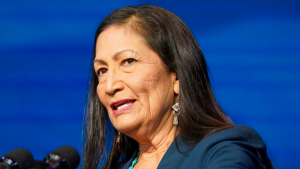
Nearly $1 million in federal funds aimed at helping Native American tribes with what are called climate resilience projects is going to four tribes in Oklahoma.
It’s part of $120 million in funding for 146 Indian projects across the U.S., according to an announcement by the Interior Department. The Chickasaw Nation will receive more than $4.2 million, the largest of grants to tribes in the state.
The biggest of the grants to the Chickasaw Nation, $4,184,611, is for restoring the Blue River through Collaborative Conservation. The Blue River Watershed’s perennial flows serve as a readily available water supply for The Chickasaw Nation and through this project, will be restored and protected for future generations.
Through the Blue River Watershed, the CN can ensure the survival of culturally important habitats for future generations, making the protection of this river imperative. The tribe and partners will mitigate this threat through the project by enabling the implementation of comprehensive, grassroots conservation efforts to encourage climate sustainability, improve water quality and quantity, reduce wildfire risks, address habitat fragmentation and improve forage and wildlife habitation throughout 15,000 acres of the Blue River Watershed.
The Chickasaw Nation also received $250,000 to finance a Climate Vulnerability Assessments Project. These vulnerability assessments will address climate change related exposure across the tribe’s 13-county treaty territorial boundaries, including sensitivity, adaptive capacity and vulnerability for facilities and infrastructure.
This project aims to develop and conduct vulnerability assessments that will advance The CN’s capacity for both adaptation planning and climate resilience by focusing on climate changerelated exposure within five CN-owned properties, according to the Interior Department announcement.
The Choctaw Nation received $250,000 for a Water Infrastructure Vulnerability and Resilience Planning Project.
The CNO will provide consultants to various water districts and communities in the reservation for the purpose of conducting water rate studies, and to perform utility rate & funding analysis, infrastructure vulnerability reviews, and other reviews as deemed needed.
The Muscogee (Creek) Nation received $215,770 for the Arkansas River Restoration & Erosion Prevention Project. The Interior Department stated that climate change poses severe and multifaceted challenges to the tribe, “jeopardizing cultural heritage, economic stability, and the overall well-being of its citizens.”
The tribe is considered the fourth largest in the U.S. with a reservation of nearly three million acres. The Muscogee nation, according to the announcement, has started combating the effects of global warming by investing in infrastructure,
research, and direct services that benefit both tribal and non-tribal members within the reservation; however, for
these programs and developments to fully meet the community’s needs, the Nation needs to grow its internal Bureau of Indian Affairs.
A fourth tribe, the United Keetoowah Band of Cherokee Indians in Oklahoma, received $198,628. According to the Interior Department, the tribe recognizes and is concerned about the change in climate impacting tribal members residing within the fourteen-county boundaries of the Tribal Nation, with many citizens directly and indirectly affected by extreme storms and weather induced emergencies.

Interior Secretary Deb Haaland told reporters the funds are the largest single awarad of annual climate funding to tribes in the history of the Bureau of Indian Affairs. In all, 102 tribes and nine tribal organizations received funds.



